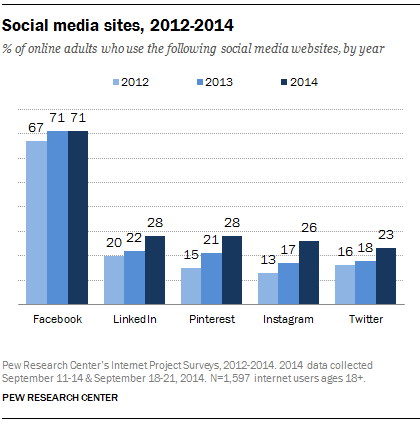
Like brushing your teeth or staring hollow-eyed into your smartphone to the exclusion of life forms around you, Facebook is so thoroughly ingrained in the day-to-day existence of many that we don’t even think about it anymore. Alas, those remaining Internet users in the United States who don’t Facebook now, likely never will. That’s the looming takeaway from the latest social media study from the Pew Internet Research Project.
We all know that old chestnut about how “uncool” teens find Facebook. Indeed, Pew confirmed Facebook users are getting older; for the first time in 2014, more than half of online adults ages 65 and older are on Facebook. But neither cliché nor boomers have budged Facebook’s numbers in the 50 states.
See also: Facebook CEO Invites Us To Consume Mass Quantities … Of Book-Larnin’
Facebook membership in the U.S. is holding steady, with 71% of Internet users ages 18 and older are active on the site, according to Pew’s September 2014 survey. That number hasn’t budged since August 2013, but that doesn’t mean Americans have reached peak Facebook. In fact, the world’s largest social network is far from entering terminal decline in the U.S., as those of us who have Facebook accounts are spending more time there than ever before.
Of the members among us, 70 percent of those surveyed owned up to engaging on Facebook once a day, which Pew calls a “significant increase from the 63% who did so in 2013.” Meanwhile, 45% of members admit to visiting Facebook several times a day. What’s more, while most all the popular social networks saw a boost in both membership and activity, they still have a ways to go before they’re gaining on Facebook. Here’s how Pew breaks it down:

- About half (49%) of Instagram users and 17% of Pinterest users engage with their respective platforms daily, although neither of these represent a significant change from 2013.
- Some 36% of Twitter users visit the site daily, but this actually represents a 10 point decrease from the 46% who did so in 2013.
- While the 13% of LinkedIn users who engage with the platform daily is unchanged from 2013, the proportion of users who use the site weekly or less often increased significantly—that is, more users log on less frequently.
Indeed, Facebook is more firmly fixed in our daily routines than, say, flossing our teeth. Many use Facebook as a “home base” of social media, according to the Pew study. It’s the most popular site for the social network-monogamous; 79% percent of Internet users belong to only one.
For the 52% of Internet users in relationships with several social networks, a “significant majority” use Facebook far more than Twitter, Instagram, Pinterest and LinkedIn. That basic finding hasn’t changed in three years.
Facebook Has A Plan … It Includes Apps And Video
As the most recent Pew study finds, Facebook retains the significant lead in active members in the U.S. But history shows the social network is no hare among tortoises. Outside the U.S., Facebook remains in a fierce battle with Google to gain the loyalty of Internet-nascent countries.
In 2012, Facebook CEO Mark Zuckerberg introduced Internet.org, a Facebook-led initiative to bring the mobile Internet to the two-thirds of the planet’s population who are currently without access. Six months later, Facebook paid $16 billion for WhatsApp, a free-messaging app with a big footprint outside the U.S. in areas where mobile phones are the prime method of Internet access. Long story short, there are more places than the U.S. to grow membership.
See also: Facebook’s Trending Wants To Be Your Mobile News Reader
In the U.S., it’s all about increasing engagement, which Facebook is getting increasingly good at. Facebook’s efforts to own video—a traffic driving goldmine on both desktops and mobile devices—are paying off. On Wednesday, the social network announced that video posts per person have increased 75% globally, and 94% in the U.S. since the last year. At least 50% of U.S. users view one video on Facebook a day. This success was echoed by analytics firm Socialbakers, which found that in the last year, brands posted 20,000 more videos on Facebook than they did on YouTube.
Facebook is already the largest photo-sharing website on the Internet, a crown it nailed down in 2011 prior to its $1 billion purchase of Instagram. It’s also where 30% of its users go to get the latest news, according to Pew study published in September 2014. Facebook is working hard to increase that number so it can supplant Twitter as the de facto social network for breaking news.
In December, Facebook made several major updates to Trending, its Twitter-like zeitgeist-monitoring feature. Along with categories which allow searches by public posts from people in the area if a breaking story, Trending also finally became available on mobile.
If all this isn’t enough to keep you from clicking away from Facebook, there’s always Zuckerberg’s book club. Inviting others to participate in his New Year’s resolution, to read a new book every other week, Zuckerberg launched the Year In Books community page on Facebook; more than 235,900 “likes” and counting.
Lead photo courtesy of twicsy.com; Social media membership graph courtesy of Pew Internet Research
















